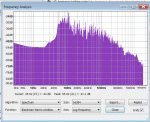Backspacez
New member
I always hear people talking about how you need to master in a real studio and this and that. Why? What is so important about mastering? For example to quote an article from AudioFanZine
Isn't mastering kind of just getting it loud and stuff? Are they just saying that because they're engineers and they kind of overestimate the role of mastering? Or is there something about mastering that makes stuff better?
"A writer’s words are not complete until the editor approves them. A painter’s work is not complete until it has been matted and framed. A musician’s work requires the same treatment. Audio production should not be rushed, finished haphazardly or completed “just to get it out there”. A finished product should reflect all of the work of the artist, producers and engineers that carry that vision forward. Even a “perfect” mix needs mastering to a degree. In this case, you want the mastering to be as transparent as possible so that the original sound is maintained while preparing it for the final media."
Isn't mastering kind of just getting it loud and stuff? Are they just saying that because they're engineers and they kind of overestimate the role of mastering? Or is there something about mastering that makes stuff better?



